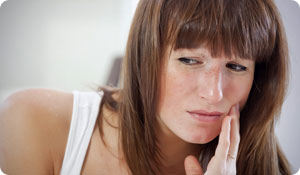
Are you noisy in bed? You may be a nocturnal grinder, waking up your bed partner as you feverishly wear down your teeth. Even if no one's noticed, your dentist can surely tell.
Nocturnal bruxism—or nighttime teeth grinding—is a noisy, often destructive habit, but one you might not be aware of, especially if you sleep alone. Teeth grinding not only creates loud, unpleasant sounds, it can wear out your teeth, damage your jaw, cause pain in the head and neck area, and change your appearance, over time. According to Columbia University Medical Center, bruxism can lead to or aggravate temporomandibular disorders (TMD), which affect the muscles, joints and nerves associated with the jaws.
If you wake up with an achy jaw, sore neck or shoulders or a headache, or if your teeth are sensitive to hot or cold or appear yellow on the surfaces where the top teeth meet the bottoms, these may be signs of nighttime grinding.
A variety of mouth guards and appliances are available for night grinders. Night guards are designed to reduce the pressure of constant grinding on your teeth. But many mouth appliances are not effective over the long term, or too uncomfortable for people to use on a regular basis. There are other steps you can take to try relieve the pain of bruxism and reduce the frequency and intensity of night grinding.
- Eliminate or reduce stress. Although stress is not considered the primary cause, it is associated with triggering or worsening of teeth grinding. If you can't eliminate your source of stress, try meditation, yoga and other types of physical and mental exercises to help you relax and cope better with stressful situations.
- Avoid eating hard, overly chewy or tough foods that put pressure on the jaw.
- Relive jaw pain with ice packs or wet heat.
- Speak with your doctor or dentist about physical therapy that can teach you how to relax your facial muscles and joints and perform exercises to help restore balance and alignment in your jaw.
- Consider medication. In severe cases, your doctor may recommend short-term use of medication, such as a muscle relaxant or sleeping aid.
Sources:
Columbia Unviersity Medical Center Department of Rehabilitation and Regenerative Medicine. "Temporomandibular Disorder (TMD). Web. 18 Oct 2010.
http://www.cumc.columbia.edu/dept/rehab/musculoskeletal_health/tmd.html
Davidison, Terence, MD. "Consultation for Temporal Mandibular Joint Disease (TMJ)" University of California, San Diego. 2010. Web. 18 Oct 2010
http://health.ucsd.edu/specialties/surgery/davidson/consults/tmj.htm





